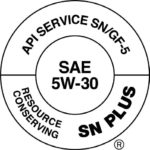
Some customers may favor diesel oil over gasoline oil for a number of reasons:
- Diesel oil is perceived as more “heavy-duty” than gasoline oil.
- Some customers desire a higher viscosity, and it may be easier to find a 5W-40 or 15W-40 diesel oil than gasoline oil.
- Diesel oil typically contains more robust detergency additives than gasoline oil.
It is safe to use a diesel oil in your gasoline engine, provided it meets the appropriate specifications and viscosity requirements of the engine. For example, if your gas engine calls for a motor oil that meets the API SN specification, you can safely use a diesel oil of the correct viscosity that meets the API SN spec. For the typical gasoline application, however, a diesel oil isn’t required and the more appropriate choice is a quality gasoline motor oil for both performance and value.
Pay attention to oil specifications
The
American Petroleum Institute (API) publishes its “C” category of
specifications for diesel oil (currently CK-4) and its “S” category for
gasoline motor oil (currently SN). It’s common for today’s diesel oils
to carry both the API CK-4 and API SN specifications. Though they’re
truly designed for diesel applications, they can be used in gasoline
applications for motorists who want to use one oil in all applications.
If the diesel oil carries both specs, the oil is safe to use in diesel
and gasoline applications. If the diesel oil does not carry the “S”
category, we strongly recommend against using it in gasoline
applications.
The correct oil formulation for the application
In
the past, motorists may have heard diesel oils were tougher than
gasoline oils for a number of reasons, including higher viscosity,
improved corrosion protection, higher Total Base Number and more. Diesel
oils are often thought to be formulated with special components not
available in gasoline oils, such as more robust detergency additives to
handle the soot inherent to diesel engines. In some motorists’ minds,
diesel oils are still analogous to better protection.

While that may have been true in the past, modern oils are formulated for their intended applications. While both diesel and gasoline oils contain many of the same additives to guard against wear, corrosion, foaming and more, they also contain additives designed to manage the byproducts of combustion. Some of those byproducts change, depending on whether the engine runs on gasoline or diesel fuel. If your vehicle uses a gasoline engine, it’s best to use an oil that contains the correct additives to handle the byproducts of gasoline combustion. The same holds if you’re operating a diesel engine.
When to favor diesel oil over gasoline motor oil
If your gasoline engine is heavily modified to put out more horsepower, using a diesel oil can be beneficial. It’s likely modified engines will need a higher viscosity to withstand the increased stress. You can turn to diesel engine oils for those needs or you might want to consider a racing oil, depending on your engine modifications and lubrication requirements.

Many times the engine builder will help provide insight as to what success they have found. Outside of that, if you have a bone-stock gasoline-powered application it’s best to stick with a gasoline motor oil. They are designed for that type of application and have the components required to manage that engine.
AMSOIL Signature Series 5W-30 Max-Duty Synthetic Diesel Oil
AMSOIL Signature Series 5W-30 Max-Duty Synthetic Diesel Oil (DHD) is a premium-quality, versatile oil that is ideal for mixed fleets of diesel and gasoline vehicles, offering the ultimate in protection, performance and convenience.
I buy this product again and again By Dwayne, a Verified Buyer on 8/30/2019 I am a long time user of many Amsoil products and am very happy with all of them. I never worry about wear in my Duramax with Amsoil Max-Duty Synthetic. I was convinced that Amsoil was a far superior lubricant after reading about Amsoil's initial development. This was high-tech before high-tech was common outside of military applications. It took real vision and perseverance to develop synthetic lubricants that are truly affordable.


